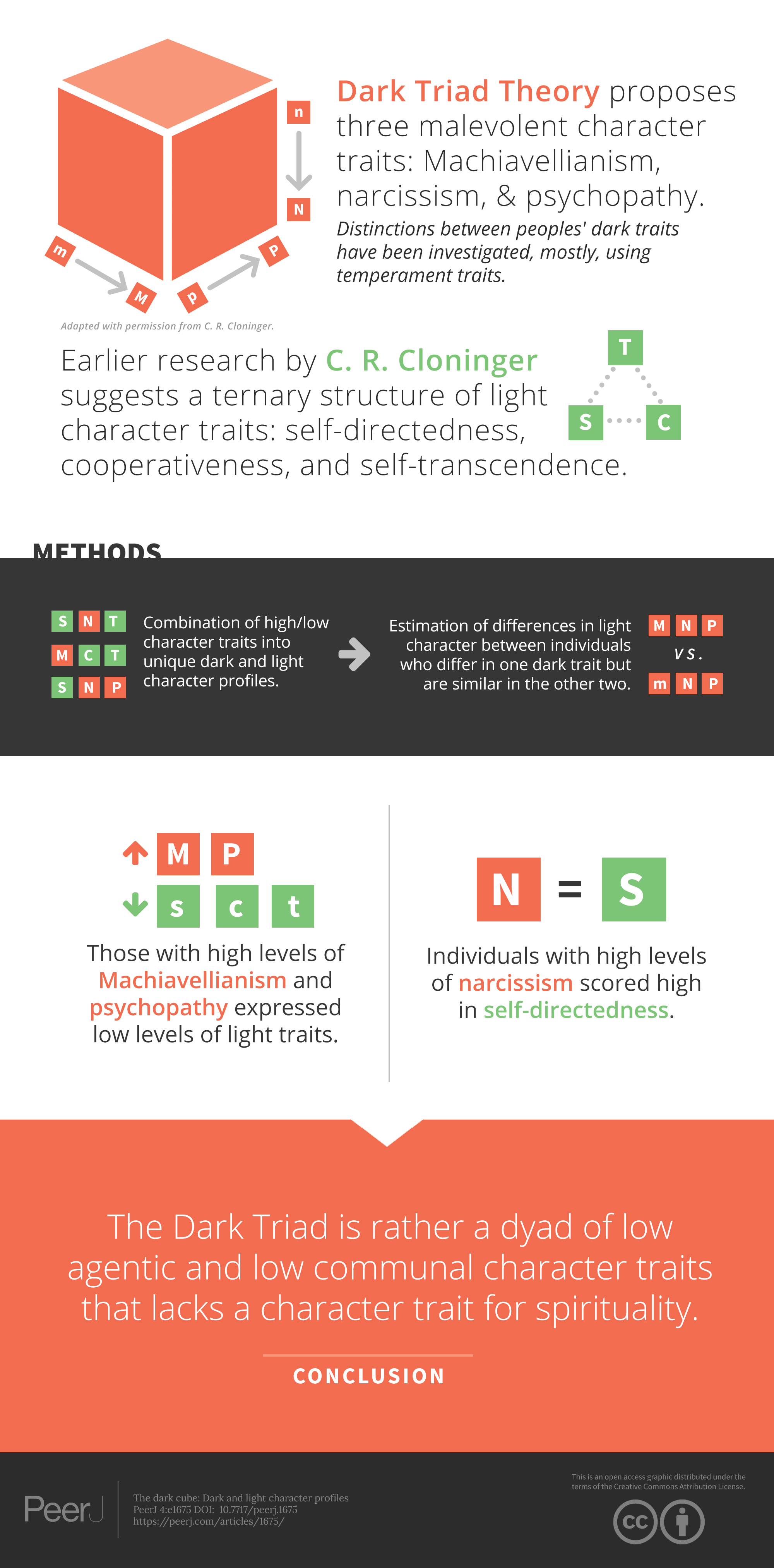LAY SUMMARY
Current notions of people’s malevolent or dark character suggest three distinct traits: Machiavellianism, narcissism, and psychopathy. However, using dark profiles (i.e., individuals combination of these three dark traits) rather than linear statistics, we here demonstrate that the individuals who are high in Machiavellianism and psychopathy share a unified non-agentic and uncooperative character (i.e., irresponsible, low in self-control, unempathetic, unhelpful, untolerant), while individuals high in narcissism have a more unique character configuration expressed as high agency and, when the other dark traits are high, highly spiritual but uncooperative. In other words, based on differences in their associations to the light side of character (i.e., a ternary construct: self-directedness, cooperativeness, and self-transcendence), the Dark Triad seems to be a dyad rather than a triad.
ABSTRACT
Background. Research addressing distinctions and similarities between people’s malevolent character traits (i.e., the Dark Triad: Machiavellianism, narcissism, and psychopathy) has detected inconsistent linear associations to temperament traits. Additionally, these dark traits seem to have a common core expressed as uncooperativeness. Hence, some researchers suggest that the dark traits are best represented as one global construct (i.e., the unification argument) rather than as ternary construct (i.e., the uniqueness argument). We put forward the dark cube (cf. Cloninger’s character cube) comprising eight dark profiles that can be used to compare individuals who differ in one dark character trait while holding the other two constant. Our aim was to investigate in which circumstances individuals who are high in each one of the dark character traits differ in Cloninger’s “light” character traits: self-directedness, cooperativeness, and self-transcendence. We also investigated if people’s dark character profiles were associated to their light character profiles.
Method. A total of 997 participants recruited from Amazon’s Mechanical Turk (MTurk) responded to the Short Dark Triad and the Short Character Inventory. Participants were allocated to eight different dark profiles and eight light profiles based on their scores in each of the traits and any possible combination of high and low scores. We used three-way interaction regression analyses and t-tests to investigate differences in light character traits between individuals with different dark profiles. As a second step, we compared the individuals’ dark profile with her/his character profile using an exact cell-wise analysis conducted in the ROPstat software (http://www.ropstat.com).
Results. Individuals who expressed high levels of Machiavellianism and those who expressed high levels of psychopathy also expressed low self-directedness and low cooperativeness. Individuals with high levels of narcissism, in contrast, scored high in self-directedness. Moreover, individuals with a profile low in the dark traits were more likely to end up with a profile high in cooperativeness. The opposite was true for those individuals with a profile high in the dark traits. The rest of the cross-comparisons revealed some of the characteristics of human personality as a non-linear complex dynamic system.
Conclusions. Our study suggests that individuals who are high in Machiavellianism and psychopathy share a unified non-agentic and uncooperative character (i.e., irresponsible, low in self-control, unempathetic, unhelpful, untolerant), while individuals high in narcissism have a more unique character configuration expressed as high agency and, when the other dark traits are high, highly spiritual but uncooperative. In other words, based on differences in their associations to the light side of character, the Dark Triad seems to be a dyad rather than a triad.
CITATION
(2016) The dark cube: dark and light character profiles. PeerJ4:e1675 https://doi.org/10.7717/peerj.1675
